As an Amazon Associate I earn from qualifying purchases.
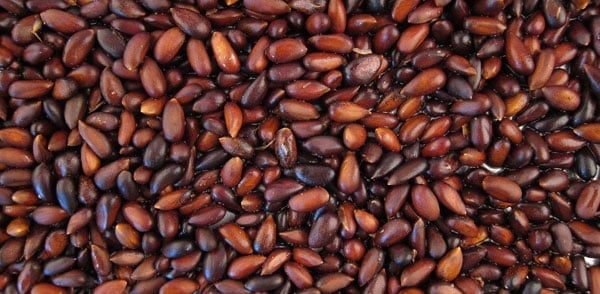
If you’ve ever bought pine nuts in the store, chances are you’re eating Chinese imports that are often of dubious origin. And even if you are vigilant about where your pine nuts come from and buy, say Italian pine nuts, you may get high quality, but you pay for it through the nose.
Why aren’t there American pine nuts, you ask? Well, there are. You just have to go find them yourself. It requires some persistence, but here’s how to harvest pine nuts.
First off, you really must live in the West to do this. Unless you can find a stray Italian stone pine planted somewhere as a landscaping tree, eastern pine nuts are too small or have shells too hard to bother with. Sorry, guys.
If you are in the West, you are mostly looking for two types, both called piñons: Pinus edulis and P. monophylla. Yes, a few other pines have good-tasting nuts, chiefly the sugar pine and the gray pine, which I’ve written about before. But the real action is with the two piñons.
Where to find them?
Pinus edulis is mostly a tree of the Southwest, and you can look for is from San Bernardino County in California to most of Arizona, New Mexico and Utah, southern and western Colorado, two southern counties in Wyoming, and two counties outside of El Paso, Texas.
Pinus monophylla is a Great Basin tree, and you’ll find it on the eastern side of the Sierra Nevada in California, as well as throughout SoCal, almost all of Nevada and Arizona, all of western and southern Utah, two southern counties in Idaho, and, weirdly, Luna County in New Mexico.
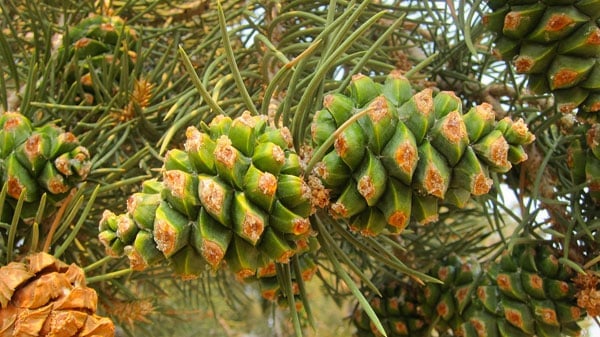
Both are rather scrubby looking pine trees that like the high desert. The tree at right is a singleleaf piñon — P. monophylla — in eastern California and is typical of the species. P. edulis, the two-leaf piñon, is similar-looking if not even scragglier.
Once you find some trees, start scoping them out in early August. You’re looking for trees that have lots of green pinecones on them. Not every tree will set cones, and only Mother Nature knows why. But you can find loaded trees next to barren ones. Sometimes small variations in elevation or whether the trees are on a north or south face of a slope can matter a lot. Once you find the trees, remember where they are.
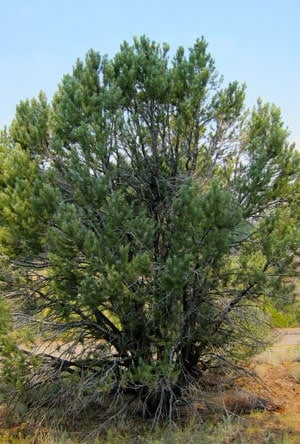
Return to them around Labor Day. It sounds early, but you need to beat the Insane Rodent Posse (IRP) to these tasty nuts. In my spot, there are several chipmunk or ground squirrel holes under each piñon and they are just waiting for each cone to open. I am betting that the nuts are gone within 24 hours of a cone opening. Under no circumstances can you wait until October to gather your nuts, or you risk them all being scurried away by the IRP.
How to gather? First, buy a cheap pair of gardening gloves. The cones are coated in pitch, a sweet-smelling sticky resin that will get on everything. It happens to be one of the most lovely smells in the world, so it’s not all bad. But your gloves will get wrecked, so be prepared for that. Pick each cone into a paper grocery bag.
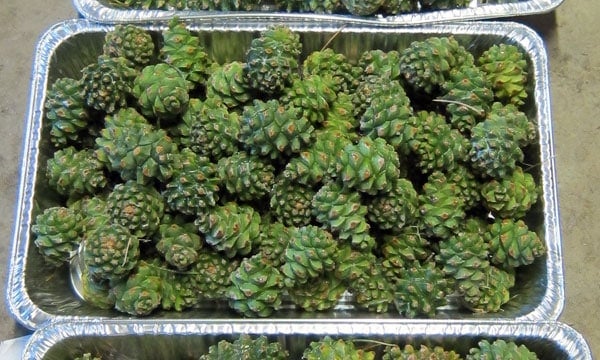
When you get home, lay the green cones out in cheap foil roasting trays or some other shallow, wide container you can stack no more than two cones deep — if you stack them too deep they can get moldy. Enjoy the wonderful aroma and wait. Eventually, they will begin to open on their own.
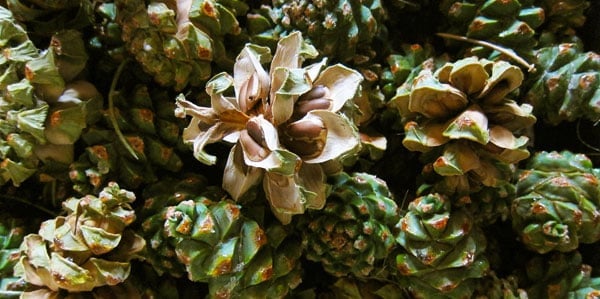
When the cones do open, about 3 weeks or so, pick out all the nuts from within. You’ll get a little pitch on your hands, but it comes off with oil.
Not all nuts will be good nuts, alas. It’s a fact of pine nut processing that can be depressing. All that waiting and work, and sometimes your yield is a crappy 50 percent or worse. It happens. At least there’s an easy way to tell if your nuts are good or not. Dump all the nuts in a bucket of water. About 85 percent of those that float are no good. The sinkers are the keepers.
There is something you can do with the floaters, however. You can mash them up — most won’t have any nut at all inside — fill a Mason jar full and cover it with vodka. Put a lid on the jar, wait a few months and bam! Pine nut bourbon. Damn good stuff.
You’ll notice something: Dark nuts are good nuts. The darker the shell, the more likely the nut is a good one. The nut on the left is a P. monophylla nut, the one on the right is from P. edulis.
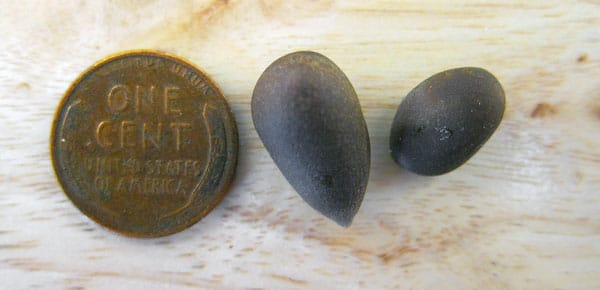
As for the good nuts, you will still need to shell them. See why store-bought pine nuts are so expensive? Sadly, there is no fast way to shell pine nuts. The most effective way is still one at a time, and believe me, I’ve tried lots and lots of different ways to shell these little buggers. This video shows it really well.
Once they’re shelled, freeze the nuts. In fact, freeze even the nuts still in the shell if you plan on keeping them around for more than a couple weeks. Pine nuts are surprisingly perishable. Once frozen, however, in-shell pine nuts will keep for 2 years or more. Oh, and don’t forget to use the shells for more pine nut bourbon…
Looking for pine nut recipes? Here are three of my favorites:
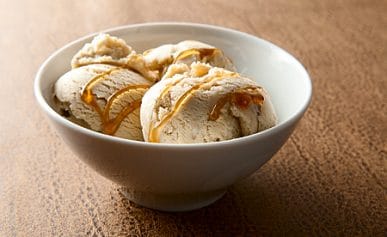
Pine Nut Ice Cream
A pine nut and honey ice cream I am proud of. Awesome drizzled with desert honey, or pine syrup.
Read More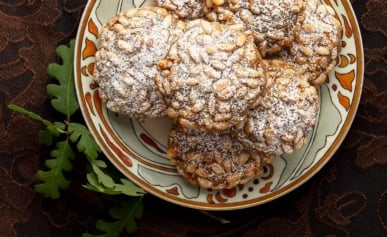
Pine Nut Cookies
Killer pine nut cookies! Easy to make and, like potato chips, hard to eat just one…
Read More
Pine nut encrusted trout reflects the flavors of the Great Basin, where both are native.
Read More
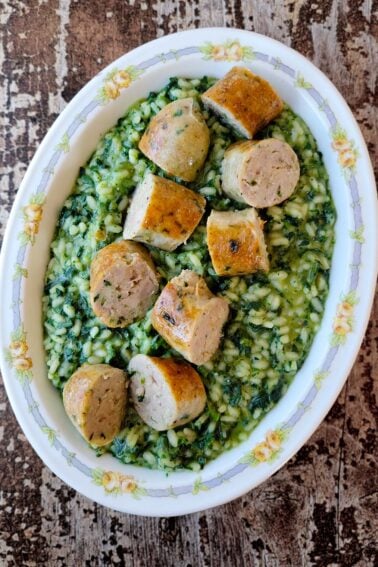
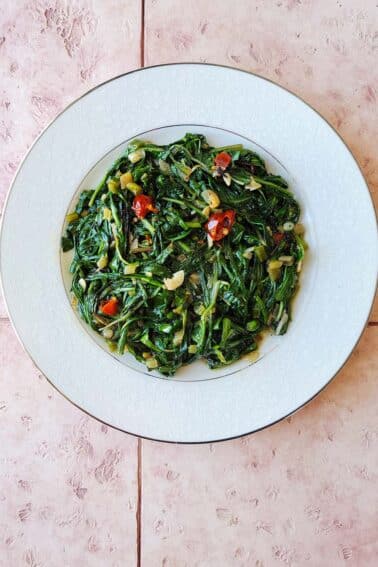
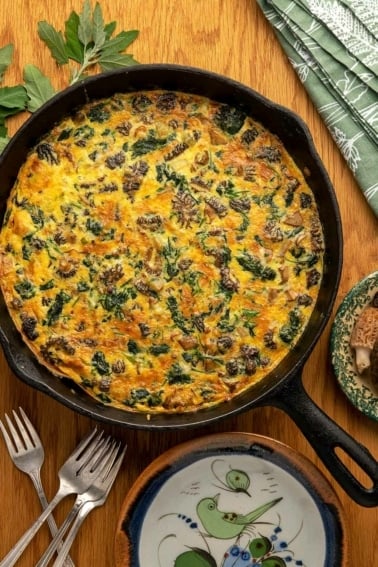
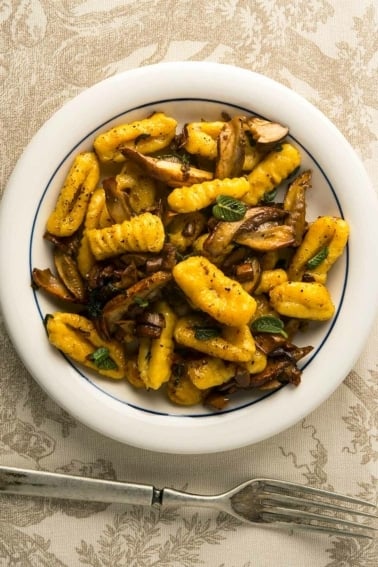
My mother made meat (beef tongue) empanaditas for Christmas. She would include pinon nuts that she had painstakingly cracked herself during the previous month, careful to hide the resulting nuts from her eager kids. The memory is nearly as delicious as the empanadita itself.
Hi I live in northeast in Arizona in the White Mountains. I looked where I used to go and found nothing. My sister and I will go back to look. I used to get so many of the onions. It looked like the trees were bare. I can’t understand why? Oh when we went I got stung by a bee someone it using this area for honey bees. I am allergic haha. Anyway were going back to check next week. Were in October now 2019.
Thanks
I am also in the white mountains and am wondering if you found them? We couldn’t remember when we saw them last yr but we were too late. Im wondering if we missed it again
Chrysi: You harvest pine nuts around Labor Day. It’s way too late now.
my mom tells stories about picking pine nuts in Nevada when she was a kid, whole families loading up in the back of a pickup truck and heading out. According to her stories, they brought burlap bags, filled them with cones, and then wend to nearby hotsprings, where they would submerge the bags and melt-wash the pitch off! And wash the kids while they were at it.
So why take the whole cone home?
I can see the nuts almost dropping out of the cones that are still attached to the tree. Are those nuts no good? Alas they are very sticky and can’t imagine how much gunk would be on my hands after a day of harvesting right off the tree. Many people pick the piñon nuts off the ground , are those no good also? Don’t the nuts get roasted to remove the shell which is a thin paper more then a hard shell. Couldn’t I roast them in an old electric popcorn popper? Kinda like coffee roasting. This year the piñon trees are weighted down with nuts but then again the sticky sap keeps me away. I was hoping someone had a good way of getting the nut out of the cone without having to pick at them.
You harvest wearing cheap leather gloves, which you toss afterwards. Sap is part of the deal with pine nuts, I’m afraid.
Pine nuts can be harvested in October if the cones open and strong winds have not blown in that area. I live in Carson City NV and a range named the Pine nut Mountains is full of trees that can be beaten with a pole after laying down tarps, then drag to the next tree and repeat. Pine nut pancakes with elderberry syrup is very tasty too. I still prefer to gather the green cones.
I live in New Mexico, where is the best place to pick Pinon this year?
Veronica: No idea. I live in California.
Was in Gallup NM South of town I harvested 30 pounds in two weeks
It varies year to year
Can I freeze pinon nuts I freezer paper?
Beverly: I freeze unshelled nuts in a plastic bag.
You can also lay down a blanket under the tree and shake it. That works good, that is, if your pinion cones are open.
Is it necessary to wait for the cones to fall? If not, how are they picked safely?
Robert: For bull pines? Yeah, it’s pretty necessary. Not necessary for pinons. I pick them off the trees green and let them ripen in my garage.
Where is the best area in utah for pinenut gathering?
TJ: Sorry, I don’t live there, so I don’t know.
I’ve always liked pinones, have eaten them toasted in salads at Mexican restaurants, just delicious. So, I decided why not do this at home, and toast them myself?
We bought a bag of raw pignolias (Pine Nuts) from Trader Joe’s. I never did open them and they are now possibly a year old. The label says they come from Korea, Russia and Vietnam. Are these sources better than China?
The label also gives a warning that some people will have a bad reaction to them, a bitter or metallic aftertaste. Can you explain what would cause this?
Karen: Yes, “pine mouth” is caused by these Asian pine nuts. Some species of pine have nice nice, some cause this metallic thing. The people who collect them adulterate the good ones with the bad ones.
Replying to Micheal who wrote about the Goshute tribe in Utah: where can I find them? Town, crossroads, etc…Would like to go out this weekend and buy some pine nuts from the tribesmen.
Great article very interesting.I know it is late but we have been looking for the pine nuts everywhere and cannot find any for a couple years already.People selling them on street corners will not give up there location if you ask them and they charge allot. Do you have any idea were they can be found this year?
Great article. Any idea where the nuts will be this year (2018) in New Mexico?
Hello
Have you ever seen the pink cone variety?
I love pine nuts. In our area in Utah, the Indians sell them in bags for around 15 bucks a pound on side of the road with their Jewlery. In our area it’s the Goshute tribe a sub tribe off Ute. Yummy stuff. Great people.
Thank you for the information. Hopefully I can beat the birds to them this year.
I found a recipe of yours on Pinterest for pinon flavored spirits. You wrote that you just used the shells and let those steep in grain alcohol for a year. Do you have to shell the pinon nuts and just use the shells or can I use the whole nut/shell and let it steep? I always have a ton of pinon nuts and if I could skip the shelling part that would save a great deal of time. Thanks!
Eric: The shell is what gives you the most flavor, so maybe just smash some nuts to do it?
I love, love, love pine nuts but live in Ontario, Canada where there are a lot of pine trees. Are the pine nuts still edible even though not in stores? Thank you!
Where can you purchase this tree in the High Desert of Calif? I see people selling “seeds” but not the actual trees.